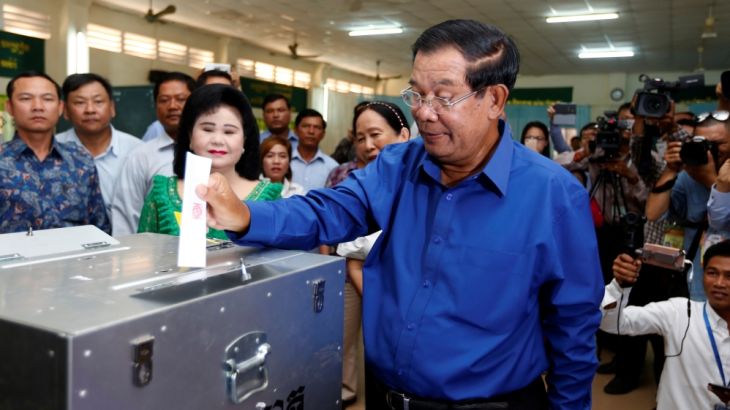Cambodia election: Local poll seen as test for Hun Sen
Long-ruling PM warned of ‘civil war’ if his party loses, drawing accusations his government is undermining democracy.

Voters in Cambodia are casting their ballots in local polls that are seen as a test for long-ruling Prime Minister Hun Sen’s popularity and leadership ahead of a general election next year.
While there are 12 parties vying for votes in more than 1,600 communes, the main competition is between Hun Sen’s Cambodia People’s Party (CPP) and the largest opposition party, the Cambodian National Rescue Party (CNRP), led by Kem Sokha.
In the lead-up to Sunday’s vote, Hun Sen, who has run Cambodia for 32 years, warned that the country will descend into “civil war” if his party loses, drawing sharp accusations that his government is undermining democracy.
Supporters see 64-year-old Hun Sen as a beacon of stability, but opponents accuse him and a coterie of allies of huge self-enrichment, corruption and autocracy.
In recent months, the opposition has been hammered by a crackdown, with critics jailed and Sam Rainsy, Hun Sen’s main political rival, fleeing overseas to escape charges.
![Kem Sokha, president of the CNTP, votes in Kandal province [Samrang Pring/Reuters]](/wp-content/uploads/2017/06/e35bc78ad10746a9aafdf0affa1f0a3b_18.jpeg)
Voters queued at polling stations in the capital, Phnom Penh, before they opened at 7am (00:00 GMT). They close at 3pm (08:00 GMT) and results are expected in the hours after that.
“I voted for justice in society,” said Chan Dy, 69, told the Reuters news agency.
“This election will help to make work happen at the commune level. Corruption is a big problem and that’s why I voted to have things work more smoothly,” he said, declining to say which party he voted for.
|
|
Hun Sen cast his ballot shortly after polls opened in Takhmao, a town on the outskirts of Phnom Penh, where he has a residence and a nearby bodyguard unit stationed.
He declined to speak to media but appeared relaxed, smiling and waving to voters as he passed.
The last time Cambodians went to the polls, in 2013’s national elections, the opposition made huge gains, spurred in part by a significant appetite for change among young voters.
The opposition says it only lost that vote because of widespread fraud, something the government denies.
But analysts say that result was a scare for a leader unused to losing and that the recent crackdown on the opposition is an attempt to ensure this does not happen again.
Key vote
Al Jazeera’s Wayne Hay, reporting from Phnom Penh, said that although these are only local elections, there is still a lot at stake.
“The CNRP feels that it can build on the good results that they had in the last general election four years ago and then carry that forward into the next general election which is coming up in July next year,” he said.
In a possible sign of nerves, Hun Sen broke with his tradition of avoiding the campaign trail to lead a massive pro-government rally for his Cambodian People’s Party (CPP) on Friday in Phnom Penh.
“We haven’t seen Hun Sen on the campaign trail during an election in something like 20 years, so that may well tell us something about how he is feeling about the results of these communal elections,” Hay said.
“His rhetoric has been typically fiery, typically aggressive leading up to this vote,” he added. “We heard the defence minister saying people would have their teeth smashed if they contest the results of this vote.”
The CNRP also held a rally on Friday but it was noticeably smaller in size.
They have proven particularly popular among young voters who often complain about a culture of corruption that only seems to benefit a wealthy elite or those with the right connections.
Cambodia has one of the world’s youngest populations, with some 70 percent of the country under 30, and their growing political clout is being heavily courted.
Yet the opposition movement has been dented by Hun Sen’s crackdown, with at least 27 Cambodian human rights defenders and political activists thrown behind bars since 2013, according to a recent Amnesty International report.